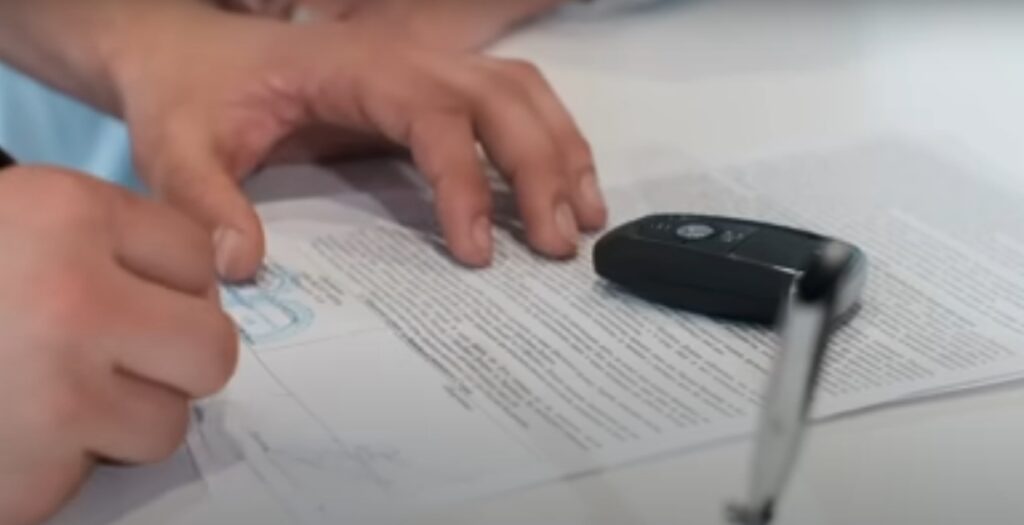
Ethical Considerations in Vehicle Sales
Imagine you walk into a car dealership, excited to get behind the wheel of your dream car. However, as you start talking to the salesperson, you feel uneasy. Perhaps they are using high-pressure vehicle sales tactics or trying to sell you add-ons that you don’t need. Sometimes, you are unsure if the vehicle’s history is as clean as they claim. These scenarios aren’t uncommon in the car dealership industry.
Ethical Issues in Vehicle Sales

This is why ethics is so important. Ethics is about doing the right thing – even when no one is watching. Ethical behavior is critical in vehicle sales, where high-stakes sales and complex financing arrangements can lead to conflicts of interest. We’ll take a closer look at the ethical considerations in the industry.
We’ll explore the common ethical issues that arise and the consequences of unethical behavior. We will also discuss the guidelines that car dealerships should follow to ensure they act ethically and responsibly. Let us start with some of this industry’s most common ethical issues.
Deceptive Advertising Practices

Deceptive advertising practices are unfortunately all too common in vehicle sales. This can involve making false or misleading advertising claims or using bait-and-switch tactics to lure customers into the dealership. These practices can lead to serious consequences for both the customer and the dealership. This will lead to damaged trust and reputation, and then even lead in legal action.
Low Balling
One example of deceptive advertising practices is when dealerships advertise a vehicle at a very low price to attract customers. However, they will then add many hidden fees or charges once the customer arrives at the dealership. This is known as “low-balling.” This may lead to customers feeling cheated and taken advantage of.
Failure to Disclose Features

Another example is when dealerships advertise a vehicle with specific features or options. They will then fail to disclose that those features or options are only available on particular models or trim levels. This can be incredibly frustrating for customers who may have their hearts set on a distinct feature. They will then discover that it’s unavailable on the vehicle they were considering.
Misrepresentation of Vehicle’s History
In some cases, dealerships may also misrepresent a vehicle’s condition or history to complete the vehicle sales process. This can involve concealing or downplaying defects or accidents. They may also roll back the odometer to make the car appear newer than it is. This deception can be dangerous for customers, putting them at risk of driving an unsafe or unreliable vehicle.
Selling Unnecessary Add-ons or Upgrades to Customers

One of the most frustrating customer experiences at a car dealership is feeling pressured to purchase unnecessary add-ons or upgrades. Salespeople may use high-pressure vehicle sales tactics to convince customers that they need these additional products or services. This can lead to customers spending more money than they intended or feeling like they’ve been taken advantage of.
Examples of unnecessary add-ons or upgrades
- Extended warranties- While extended warranties can offer peace of mind for some customers, they may not be necessary for everyone. Salespeople may exaggerate the risks of not having an extended warranty or downplay the likelihood of needing one to push this product to close their vehicle sales.
- Maintenance packages- Dealerships may offer maintenance packages that include services like oil changes, tire rotations, and brake inspections. While these can be convenient for some customers, they may not be cost-effective for everyone.
- Upgraded sound systems or other luxury features- While these upgrades can be nice, they may not be essential for everyone. Salespeople may try to convince customers that they need these upgrades for a better driving experience, even if the customer doesn’t value these features highly.
Financing and Loan Practices during Vehicle Sales

Financing and loan practices are critical aspects of vehicle sales, but unfortunately, there are many examples of unethical behavior in this area. Customers need to watch out for these corrupt practices, from predatory lending practices to hidden fees.
Predatory Lending Practices
One typical example of unethical financing practices in vehicle sales is when dealerships engage in predatory lending. This can involve offering loans with high-interest rates or fees to customers who may not be able to afford them. These loans may be structured in a way that makes it difficult for customers to pay them off, leading to a cycle of debt and financial hardship.
Failing to Disclose Fees

Another red flag is when dealerships fail to disclose all the charges associated with a loan. For example, a dealership may advertise a car loan with a low-interest rate but fail to disclose additional fees. This includes origination fees, prepayment penalties, or late payment fees. This can lead to customers feeling blindsided by unexpected costs, making it difficult to budget their car payments.
Falsification of Loan Documents
In some cases, dealerships may also engage in illegal practices. THis may include falsifying loan documents or inflating a customer’s income or credit score to secure a loan. This can lead to serious legal consequences.
Misrepresenting Vehicle History and Condition

Misrepresenting the history and condition of a vehicle is a serious ethical issue in vehicle sales process. When a dealership fails to disclose information about a vehicle’s past, it can lead to customers purchasing a car that is not as advertised. This can result in financial loss for the customer and damage the dealership’s reputation.
Failure To Disclose Accident History
Another example of misrepresenting a vehicle’s history is when dealerships fail to disclose that a vehicle has been in an accident. This can be a severe safety issue. Accidents can cause hidden damage that may not be visible to the naked eye. Customers may purchase a vehicle under the assumption that it has never been in an accident, only to find out later that it has significant structural damage.
Rolling Back Odometer

Another example is when dealerships roll back the odometer on a vehicle to make it appear newer than it is. This can artificially inflate the vehicle’s value and lead customers to pay more than they should. It’s also illegal and can lead to serious legal consequences.
Downplaying Defects
In some cases, dealerships may also misrepresent the condition of a vehicle by concealing or downplaying defects. They can also conceal the mechanical issues to close their vehicle sales. This can lead to customers purchasing a car that requires expensive repairs or is unsafe to drive.
Manipulative Sales Tactics
When you walk into a car dealership, you expect to be treated with respect and honesty, but unfortunately, that’s not always the case. Some salespeople resort to manipulative vehicle sales tactics to close a sale, leaving you feeling frustrated and taken advantage of.
For example, a salesperson might create a false sense of urgency or fear in you by saying something like “this deal won’t last long” or “someone else is interested in this car. You need to act fast.” They might also use a “good cop/bad cop” approach, where one salesperson is friendly and helpful while the other is aggressive and intimidating. This can make you feel like you need to rely on a nice salesperson to protect you from the aggressive one.
Another manipulative tactic is to use flattery or compliments to build rapport with you. While this might seem harmless, it can be manipulative if the salesperson is insincere or trying to distract you from potential issues with the car or the deal.
Consequences of Unethical Behavior in Vehicle Sales

Unethical behavior in the car dealership industry can have serious consequences for customers and dealerships. Customers deceived or manipulated by salespeople will likely lose trust in the dealership and may never return. This can lead to a loss of revenue and a damaged reputation, which can take years to repair. Here are more possible damages that unethical vehicle sales practices may cause.
- Negative impact on the dealership’s reputation- Unethical behavior can lead to negative reviews and comments that can spread quickly online, damaging the dealership’s reputation.
- Legal and financial consequences, including fines and lawsuits- Dealerships that engage in deceptive or fraudulent practices can face legal penalties, fines, and lawsuits, which can be costly and time-consuming.
- Loss of business and revenue- A damaged reputation and loss of customer trust can lead to a significant loss of income for the dealership.
- Long-term damage to the dealership’s reputation- Negative experiences can have a lasting impact on the dealership’s reputation and can be challenging to repair.
- Difficulty in attracting new customers- A damaged reputation can make it challenging for a dealership to attract new customers and grow its business.
- Possible revocation of the dealership’s license or franchise- Serious fraudulent practices can lead to the cancellation of the dealership’s license or franchise.
- Potential for criminal charges and imprisonment- In cases of serious fraud or illegal activity, the dealership and the people involved can be criminally charged. In most cases, fraudulent practices can lead to imprisonment, hampering your growth.
Ethical Guidelines for Car Dealerships

Car dealerships play a crucial role in the automotive industry, connecting consumers with the cars they need and providing essential services to keep those cars running smoothly. However, as discussed earlier in this blog, the car dealership industry has faced numerous ethical concerns, from deceptive advertising to manipulative vehicle sales tactics.
In response to these issues, there have been calls for ethical guidelines to be established in the industry to ensure that dealerships operate fairly and transparently. In this section, we’ll explore some ethical guidelines that car dealerships can adopt to build trust with customers and maintain a positive reputation in the industry.
Implementing a Code of Ethics and Conduct

Car dealerships can demonstrate their commitment to ethical behavior by implementing a code of ethics and conduct. A code of ethics outlines the principles and values that guide the dealership’s actions and decisions, and a code of conduct outlines specific behaviors and activities expected of employees.
Establishing a code of ethics and conduct is not just about setting rules and regulations – it’s about creating a culture of transparency, honesty, and fairness within the dealership. By setting clear expectations and holding employees accountable for their actions, dealerships can build a reputation for ethical behavior and earn the trust of their customers.
Some elements that a code of ethics and conduct for vehicle sales may include:
- Honesty and transparency in all dealings with customers, suppliers, and other stakeholders
- Treating customers with respect and fairness and avoiding deceptive or manipulative sales tactics
- Compliance with all laws and regulations related to the industry, including those related to advertising, finance, and consumer protection
- Protection of customer information and data privacy
- Prohibition of discrimination, harassment, or other forms of unfair treatment in the workplace
- Regular training and education for employees on ethical behavior and compliance with the dealership’s code of ethics and conduct
Providing Ethical Training to Employees

Training employees is essential in promoting ethical behavior in dealership industry. Employees who understand moral principles and know how to apply them in real-world situations are better equipped to make sound decisions that align with the dealership’s values and goals.
Ethical training can cover various topics, from the basics of ethical behavior to more specific issues related to industry. Some common topics that may be covered in moral training for car dealership employees include:
- Understanding the dealership’s code of vehicle sales ethics and conduct and how to apply it in daily work
- Identifying and avoiding conflicts of interest in dealings with customers and other stakeholders
- Recognizing and avoiding deceptive or manipulative sales tactics
- Protecting customer information and data privacy
- Compliance with all laws and regulations related to the industry, including those related to advertising, finance, and consumer protection
- Building trust and long-term relationships with customers through respectful and fair treatment
Providing ethical training to employees helps them make better decisions and demonstrates the dealership’s commitment to ethical behavior. Employees who receive moral training are more likely to feel valued and supported, leading to higher job satisfaction and lower turnover rates.
Transparency in Advertising and Vehicle Sales Practices

Transparency in advertising and vehicle sales practices is critical to building trust and credibility with customers in the car dealership industry. Customers expect honesty and openness regarding pricing, financing, and vehicle history. Dealerships prioritizing transparency are more likely to earn their loyalty and repeat business.
Car dealerships can promote transparency by providing precise and accurate pricing and financing options information. This includes disclosing all fees and charges upfront, including additional add-ons or upgrades costs. Dealerships should also provide clear and precise information about interest rates, loan terms, and monthly payments to ensure customers understand the costs involved.
Another essential aspect of transparency in the car dealership industry is providing accurate and truthful information about vehicle history and condition. This includes disclosing any accidents or damage that may have occurred, as well as providing a complete vehicle history report. Dealerships should also be upfront about any issues or defects with a vehicle and provide customers with a clear understanding of what repairs or maintenance may be required.
Maintaining Honest and Accurate Vehicle History Reports

To maintain transparency and trust with customers, car dealerships must prioritize the accuracy and honesty of vehicle history reports. They need to ensure that all information in the report is based on accurate and up-to-date data, including any incidents, repairs, or accidents that the car may have experienced.
By paying attention to details and having processes in place, dealerships can maintain the integrity of vehicle history reports. Addressing concerns or inaccuracies quickly and proactively is vital to maintain customer satisfaction and loyalty. Ultimately, maintaining honest and accurate vehicle history reports promotes transparency and builds a positive reputation for the dealership.
Treating Customers with Respect and Fairness

Treating customers with respect and fairness is fundamental to ethical conduct in vehicle sales. Dealerships must strive to create a welcoming and comfortable environment for their customers where they feel valued and respected. This means providing transparent and accurate information, treating customers with patience and empathy, and ensuring they are treated fairly in all aspects of the sales process.
Fair pricing, honest financing options, and transparent negotiation practices ensure that customers are treated fairly. By prioritizing these values, dealerships can then build strong customer relationships, promoting customer loyalty and positive word-of-mouth referrals. Ultimately, treating customers with respect and fairness is not only ethically necessary, but it also contributes to the success and growth of the dealership.
Conclusion

Ethical behavior is critical to the success and sustainability of car dealerships. By prioritizing ethical guidelines and implementing transparent and fair practices, dealerships can build strong customer relationships, maintain positive reputations, also avoid legal and financial consequences.
Car dealerships must take responsibility for their actions and prioritize ethical conduct in all operations, from advertising and vehicle sales practices to customer service and employee training. By prioritizing ethical behavior, car dealerships can improve their reputations and contribute to the industry’s overall health and integrity. Therefore, it is time for car dealerships to commit to ethical behavior and take action to ensure that their customers are always treated with respect, fairness, and transparency.

Work carefully along with your healthcare
provider to develop a complete plan that comes with the most
effective natural alternatives in your specific wants.
Always seek the assistance of a healthcare provider before
utilizing cat’s claw, especially when you
have any medical situations or are taking medicines.
Whereas typically considered protected, it’s essential
to notice that the optimal dosage just isn’t well established and will range depending on the situation and
particular person.
A strong immune system not solely helps forestall sickness and an infection but also aids in the recovery course of after intense
exercises. Women’s bodybuilding is often less dependent
on steroid use as a outcome of smaller competition pool and
the higher importance of genetics. Effective muscle development is
usually slower, whereas steroid use is apparent typically – particularly with the “real” steroids
that have more potent effects. Naysayers will declare that old-time “natural bodybuilders” and strongmen discredit
this argument since many exceeded a normalized FFMI of 25 before the advent of steroids.
Pure dietary supplements improve the body’s ability to recuperate, carry out, and build muscle without interfering with hormonal stability.
They often provide important vitamins, amino acids, or different compounds the physique
must perform optimally. Unlike anabolic steroids, these dietary
supplements work harmoniously together with your physique, enhancing pure
processes over time.
The legal standing of TRT and steroids varies considerably, largely relying on the purpose of use and
the regulatory surroundings of the country in query.
TRT, when prescribed by a healthcare supplier for the therapy of diagnosed situations like hypogonadism,
is usually authorized and regarded a reliable medical remedy.
Sufferers present process TRT are using testosterone under
medical supervision to revive their hormone levels to
the normal range, addressing specific well being issues.
The use of testosterone alternative therapy (TRT) and steroids brings with it not only well being considerations but in addition authorized implications, especially in the context of sports and regulated actions.
Understanding these elements is essential
for anyone contemplating these therapies for health or performance enhancement.
The dosage and administration of TRT are carefully
calibrated to imitate the body’s pure testosterone production, aiming to
achieve and maintain hormone ranges within the normal physiological range.
If your goal is to improve energy, muscle tone, performance, and restoration without compromising
your health, sermorelin is the more intelligent possibility.
Would you consider me if I tell you that right now your CNS can generate a really intense muscular contraction that may tear your
muscle tissue and tendons? It’s attainable, however the CNS is not doing
it in order to defend the joints. If the body has not been skilled to do one thing, the
CNS won’t enable it. By Way Of training, the CNS is progressively satisfied
that it’s safe to do something.
Until you’re a whole newbie, it’s not cheap to put on 20 kilos of muscle in only
a few months (and probably not even as a beginner, either).
Besides, you understand, on this case they’re implying that the
steroids will do all of that onerous work
for you. He or she probably gave you what’s
referred to as a corticosteroid or catabolic steroid — which means, it’s
designed to suppress your body’s immune system response and its
ability to break down chemical substances. You principally have to spend years getting actually, actually sturdy on key
compound lifts, bulking to add muscle, and
systematically slicing your bodyfat share down. If you
decide to make use of gear for bulking or chopping, you have to do your research well earlier than you take your first
injection.
Following studies show the assorted circumstances during which turmeric’ bioactive constituent have shown similar or superior action than steroids.
Nevertheless, at high doses (50 µM) It stimulates cortisol secretion. One Other research on turmeric and steroids a quite
common illness of the oral cavity supplied similar results.
Recurrent aphthous stomatitis is a disease of the mucosal layer of the mouth
during which painful ulcerative lesions
are formed very incessantly. It leads to the pharmacological
effects analogous to these attributable to administration of
corticosteroids and provides an choice of extra non-toxic, efficient and cheaper
medicine.
Firstly, one of the major concerns is the financial investment required.
Steroids could be costly, particularly when factoring in the price
of the medication themselves, as nicely as any needed medical supervision and checks.
Steroid bodybuilding provides several advantages for those seeking fast muscle acquire and elevated energy.
While the use of steroids is controversial and comes with potential dangers, it has plain advantages
for individuals trying to push their physical limits and
achieve vital outcomes.
Sure, some persons are naturally extra vulnerable to zits than others.
So, if someone is big and their entire back is roofed with zits,
he’s probably taking steroids. Gynecomastia, also referred to as breast improvement
in males, is a common side impact of steroids.
It’s brought on by an imbalance between estrogen and testosterone ranges.
Because his FFMI is above 25, you probably won’t achieve this physique naturally; however, it
may be potential if you’re blessed with glorious genetics.
The FFMI is a measurement of how a lot muscle
mass you’ve relatively to your top. You can, nevertheless,
make a relatively correct estimate with a method created by natural bodybuilder Dr.
Casey Butt.
On the other facet of the argument, many individuals keep that with proper food regimen and exercise, it’s attainable
to attain the same results without utilizing steroids.
They also assist to hurry up recovery, so you’ll find a way to prepare more
frequently with out risking overtraining. Additionally, steroids assist to
advertise a extra anabolic setting in the body, which encourages muscle
development. They may cause a range of unwanted effects, together with zits,
hair loss, mood swings, and liver harm.
It can invariably be thought of as a future wonder medicine and a replacement to several poisonous steroidal medication. Curcumin inhibits oxidative stress, manipulates a quantity of biochemical pathways to
control irritation and even suppresses inappropriate immune responses.
Scientific trials prove that curcumin, when administered along with
commonplace medicine, improves therapy response.
Inflammatory bowel disease is characterized by inflammation of
enormous and small intestines. It is handled with steroids and antibiotics however long term
use of these brokers may cause unwanted effects.
Mispronunciation of steroid names also can point out
somebody’s data and expertise with steroids. Natural bodybuilding promotes mental and
physical strength, helps construct a powerful immune system, and can be simply incorporated into any
life-style. These essential amino acids are pivotal in muscle
protein synthesis and recuperation. A examine in the same journal indicates that BCAAs can mitigate exercise-induced muscle harm and foster muscle protein synthesis, facilitating quicker muscle recovery.
Gynecomastia, or the enlargement of breast tissue in males, is a standard aspect impact of steroid use.
It occurs when the physique converts extra testosterone into estrogen, leading to the development of breast tissue.
References:
bulking stack steroids (katibemaraty.com)
When I initially commented I clicked the “Notify me when new comments are added” checkbox and now each time a comment is added I get three e-mails with the same comment.
Is there any way you can remove me from that service? Appreciate it!
Here is my blog post … nordvpn coupons inspiresensation (https://t.co/cFbWYj3h3m)
Awesome blog! Is your theme custom made or did you download it from somewhere?
A theme like yours with a few simple tweeks would really
make my blog stand out. Please let me know where you got your design. Thanks
My web site nordvpn coupons inspiresensation (http://92url.com/nordvpn-coupons-inspiresensation–51824)
Hello, i think that i saw you visited my blog so i came to “return the favor”.I’m attempting to
find things to improve my web site!I suppose its ok to use some of your ideas!!
Look into my web-site; nordvpn coupons inspiresensation [http://cia.sh/nordvpn-coupons-inspiresensation–32350]
Every weekend i used to pay a visit this site, as i wish for enjoyment, since this this website conations truly fastidious funny information too.
my site; nordvpn coupons inspiresensation
nordvpn promotion 350fairfax
Hello to every body, it’s my first pay a visit of this weblog;
this web site carries awesome and really fine stuff designed for readers.
Really helpful post! I‚have been researching US car imports, and a VIN check gave me the full auction background before buying. I used this platform to check the vehicle‚is history ‚the auction sale date, damage type, and previous owners were all included. Anyone importing cars should check it out. Here‚is the link: https://vinifycheck.com/vin-check
70918248
References:
2ahukewipubipvmvnahuy7p4khwr8cqaq4lyoanoecaeqfw|the best steroids for Muscle growth
Thanks for sharing. I read many of your blog posts, cool, your blog is very good.
Thank you for writing this article. I appreciate the subject too. http://www.ifashionstyles.com
Can you be more specific about the content of your article? After reading it, I still have some doubts. Hope you can help me.
I don’t think the title of your article matches the content lol. Just kidding, mainly because I had some doubts after reading the article.
Your point of view caught my eye and was very interesting. Thanks. I have a question for you.
70918248
References:
none (Americannewsdigest24.Com)
Thank you for any other wonderful post. The place else may just anyone get that type of info in such a perfect means of writing? I’ve a presentation next week, and I’m at the search for such info.
Greetings! I’ve been reading your website for a while now and finally got the courage to go ahead and give you a shout out from Kingwood Texas! Just wanted to say keep up the fantastic work!
Do you mind if I quote a couple of your articles as long as I provide credit and sources back to your blog? My blog site is in the exact same area of interest as yours and my visitors would certainly benefit from some of the information you present here. Please let me know if this ok with you. Thanks a lot!
Wonderful blog! I found it while searching on Yahoo News. Do you have any tips on how to get listed in Yahoo News? I’ve been trying for a while but I never seem to get there! Many thanks
Thank you for your articles. http://www.kayswell.com They are very helpful to me. Can you help me with something?
Восстановление бампера автомобиля — это востребованная услуга, которая позволяет вернуть первоначальный вид транспортного средства после мелких повреждений. Современные технологии позволяют устранить потертости, трещины и вмятины без полной замены детали. При выборе между ремонтом или заменой бампера https://telegra.ph/Remont-ili-zamena-bampera-05-22 важно рассматривать уровень повреждений и экономическую выгодность. Качественное восстановление включает шпатлевку, грунтовку и покраску.
Смена бампера требуется при значительных повреждениях, когда реставрация бамперов нецелесообразен или невозможен. Цена восстановления варьируется от материала изделия, степени повреждений и типа автомобиля. Синтетические элементы поддаются ремонту лучше стальных, а инновационные композитные материалы требуют профессионального оборудования. Грамотный ремонт увеличивает срок службы детали и поддерживает заводскую геометрию кузова.
В случае возникновения затруднения, я с радостью оказать поддержку по вопросам Ремонт бампера или замена осаго – стучите в Телеграм pqc82
Great content! Super high-quality! Keep it up! http://www.kayswell.com
I want to thank you for your assistance and this post. It’s been great. http://www.ifashionstyles.com
Please provide me with more details on the topic http://www.ifashionstyles.com
Thank you for sharing this article with me. It helped me a lot and I love it. http://www.hairstylesvip.com
May I have information on the topic of your article? http://www.hairstylesvip.com
Excellent site you’ve got here.. It’s hard to find high-quality writing
like yours these days. I honestly appreciate individuals
like you! Take care!!
Also visit my homepage eharmony special coupon code 2025
Hi, after reading this remarkable article i am as well
happy to share my experience here with colleagues.
Also visit my homepage vpn
Great content! Super high-quality! Keep it up! http://www.kayswell.com
Please tell me more about your excellent articles http://www.kayswell.com
You helped me a lot with this post. http://www.hairstylesvip.com I love the subject and I hope you continue to write excellent articles like this.
Your articles are extremely helpful to me. May I ask for more information? http://www.kayswell.com
Thank you for writing this article. I appreciate the subject too. http://www.kayswell.com
Please tell me more about your excellent articles http://www.hairstylesvip.com
autosalesreviews.com
autosalesreviews.com
Надеюсь, вам понравятся и эти комментарии!
Статья содержит анализ причин возникновения проблемы и возможных путей ее решения.
autosalesreviews.com
autosalesreviews.com
autosalesreviews.com
I have figured out some points through your blog post post. One other point I would like to mention is that there are lots of games available on the market designed specially for preschool age young children. They include things like pattern recognition, colors, family pets, and shapes. These commonly focus on familiarization as opposed to memorization. This keeps children and kids occupied without having the experience like they are studying. Thanks
Great content! Super high-quality! Keep it up! http://www.hairstylesvip.com
Every weekend i used to pay a quick visit this site, as i wish for enjoyment, as this this web site conations in fact fastidious funny information too.
autosalesreviews.com
Автор статьи представляет данные и факты с акцентом на объективность.
Excellent way of telling, and nice post to take information about my presentation topic, which i am going to convey in university.
you are truly a excellent webmaster. The web site loading pace is incredible.
It kind of feels that you are doing any unique trick.
In addition, The contents are masterwork. you have done a fantastic activity on this subject!
https://tinyurl.com/28wjzmw4 gamefly free trial
Я благодарен автору этой статьи за его тщательное и глубокое исследование. Он представил информацию с большой детализацией и аргументацией, что делает эту статью надежным источником знаний. Очень впечатляющая работа!
Thanks for your help and for writing this post. It’s been great. http://www.kayswell.com
Hello mates, how is everything, and what you want to say concerning this post, in my view its in fact awesome for me.
Это помогает стимулировать обсуждение и критическое мышление у читателей.
Информационная статья основывается на исследованиях и надежных источниках.
This is the right site for anyone who really wants
to find out about this topic. You realize so much its almost tough to argue with you (not that I actually would want to…HaHa).
You certainly put a brand new spin on a topic
that’s been written about for many years. Great stuff, just excellent!
https://tinyurl.com/2y95dtjr what does vpn mean
Can you be more specific about the content of your article? After reading it, I still have some doubts. Hope you can help me.
Это позволяет читателям получить разностороннюю информацию и самостоятельно сделать выводы.
Thank you for being of assistance to me. I really loved this article. http://www.kayswell.com
Hi! Do you know if they make any plugins to protect against hackers? I’m kinda paranoid about losing everything I’ve worked hard on. Any recommendations?
Great beat ! I would like to apprentice while you amend your web site, http://www.kayswell.com how could i subscribe for a blog site? The account helped me a acceptable deal. I had been a little bit acquainted of this your broadcast provided bright clear concept
Thanks for posting. I really enjoyed reading it, especially because it addressed my problem. http://www.kayswell.com It helped me a lot and I hope it will help others too.
Your articles are extremely helpful to me. May I ask for more information? http://www.kayswell.com
May I have information on the topic of your article? http://www.kayswell.com
What’s up to every body, it’s my first pay a visit of this
webpage; this weblog contains awesome and in fact excellent data for readers.
You’ve the most impressive websites. http://www.hairstylesvip.com
Its such as you read my thoughts! You appear
to understand a lot about this, like you wrote the ebook in it or something.
I think that you simply can do with some percent to pressure
the message house a bit, but instead of that, that is fantastic blog.
A fantastic read. I will definitely be back.
I’ve learned a few important things as a result of your post. I would also like to convey that there is a situation in which you will obtain a loan and don’t need a cosigner such as a Federal Student Support Loan. When you are getting that loan through a standard financier then you need to be ready to have a co-signer ready to assist you to. The lenders will base any decision using a few issues but the largest will be your credit history. There are some creditors that will furthermore look at your job history and determine based on this but in almost all cases it will hinge on your rating.
Ethical Considerations in Vehicle Sales – Auto Sales Reviews
Ethical Considerations in Vehicle Sales – Auto Sales Reviews
Ethical Considerations in Vehicle Sales – Auto Sales Reviews
Ethical Considerations in Vehicle Sales – Auto Sales Reviews
Ethical Considerations in Vehicle Sales – Auto Sales Reviews
Ethical Considerations in Vehicle Sales – Auto Sales Reviews
Ethical Considerations in Vehicle Sales – Auto Sales Reviews
Ethical Considerations in Vehicle Sales – Auto Sales Reviews
Ethical Considerations in Vehicle Sales – Auto Sales Reviews
Ethical Considerations in Vehicle Sales – Auto Sales Reviews
https://t.me/s/TgGo1WIN/12
Официальный Telegram канал 1win Casinо. Казинo и ставки от 1вин. Фриспины, актуальное зеркало официального сайта 1 win. Регистрируйся в ван вин, соверши вход в один вин, получай бонус используя промокод и начните играть на реальные деньги.
https://t.me/s/Official_1win_kanal/3881
Your articles are extremely helpful to me. Please provide more information! http://www.ifashionstyles.com
It’s actually very difficult in this active life to listen news on Television, so I just use web for that reason, and obtain the newest news.
Надеюсь, что эти комментарии добавят ещё больше позитива и поддержки к информационной статье! Это сообщение отправлено с сайта GoToTop.ee
Touche. Outstanding arguments. Keep up the great work.
autosalesreviews.com
autosalesreviews.com
Статья содержит аргументы, которые помогают читателю лучше понять важность и последствия проблемы.
Greetings! Very helpful advice in this particular post! It is the little changes that produce the biggest changes. Thanks a lot for sharing! http://www.ifashionstyles.com
Wonderful goods from you, man. I’ve understand your stuff previous to and you’re just too excellent.I really like what you have acquired here, certainly likewhat you are stating and the way in which you say it.You make it entertaining and you still care for to keep it wise.I cant wait to read much more from you. http://www.kayswell.com This is actually a wonderful site.
Can you be more specific about the content of your article? After reading it, I still have some doubts. Hope you can help me. https://www.binance.info/ph/register-person?ref=B4EPR6J0
Ethical Considerations in Vehicle Sales – Auto Sales Reviews
Ethical Considerations in Vehicle Sales – Auto Sales Reviews
Ethical Considerations in Vehicle Sales – Auto Sales Reviews
Ethical Considerations in Vehicle Sales – Auto Sales Reviews
Ethical Considerations in Vehicle Sales – Auto Sales Reviews
Ethical Considerations in Vehicle Sales – Auto Sales Reviews
Ethical Considerations in Vehicle Sales – Auto Sales Reviews
Ethical Considerations in Vehicle Sales – Auto Sales Reviews
Ethical Considerations in Vehicle Sales – Auto Sales Reviews
Ethical Considerations in Vehicle Sales – Auto Sales Reviews
generally lost just trying to figure out how to begin. Any ideas or tips? http://www.kayswell.com
I wanted to compose you this little bit of note so as to thank you so much again on the splendid views you have contributed on this website. It’s really seriously open-handed with people like you to make easily just what a few people might have sold as an e-book to generate some cash for themselves, chiefly given that you could have tried it in case you desired. Those pointers additionally worked to become a great way to fully grasp that most people have the identical desire similar to my own to understand great deal more when it comes to this matter. I think there are several more pleasurable periods in the future for people who start reading your blog post.
Hello mates, its wonderful post on the topic of cultureand entirely explained, keep it up all the time. http://www.kayswell.com
I am really loving the theme/design of your weblog. Do you ever run into any browser compatibility issues? A few of my blog readers have complained about my site not working correctly in Explorer but looks great in Firefox. Do you have any advice to help fix this issue? http://www.kayswell.com
Автор умело структурирует информацию, что помогает сохранить интерес читателя на протяжении всей статьи.
It’s genuinely very difficult in this busy life to listen news on Television, so I just use world wide web for that reason, and take the most up-to-date news.
What a information of un-ambiguity and preserveness of valuable familiarity on the topic of unexpected feelings.
Somebody essentially assist to make critically posts I would state. That is the first time I frequented your website page and to this point? I amazed with the research you made to make this actual put up amazing. Magnificent task!
This is the right webpage for anybody who wishes to understand this topic. You realize so much its almost tough to argue with you (not that I really will need to…HaHa). You certainly put a fresh spin on a topic which has been discussed for ages. Excellent stuff, just wonderful!
Hello! I simply would like to offer you a huge thumbs up for your excellent info you have got right here on this post. I will be returning to your website for more soon.
This piece of writing will help the internet visitors for creating new web site or even a blog from start to end.
Dalton Bowens
I don’t even know how I ended up here, but I thought this post was great. I do not know who you are but definitely you’re going to a famous blogger if you are not already 😉 Cheers!
Hello There. I found your blog the use of msn. This is a really well written article. I will make sure to bookmark it and come back to read extra of your useful info. Thanks for the post.
I’m not sure where you’re getting your info, but great topic. I needs to spend some time learning more or understanding more. Thanks for great info I was looking for this information for my mission.
Hi there to all, for the reason that I am truly keen of reading this website’s post to be updated daily. It carries fastidious data.
After exploring a few of the blog articles on your site, I seriously like your technique of blogging. I book-marked it to my bookmark webpage list and will be checking back soon. Take a look at my website as well and let me know what you think. http://www.kayswell.com
I don’t think the title of your article matches the content lol. Just kidding, mainly because I had some doubts after reading the article.
Greetings! I know this is somewhat off topic but I was wondering if you knew where I could get a captcha plugin for my comment form? I’m using the same blog platform as yours and I’m having difficulty finding one? Thanks a lot!
Meri Eberhart
Автор предлагает анализ преимуществ и недостатков разных подходов к решению проблемы.
I just like the valuable information you provide on your articles.I’ll bookmark your blog and test again here frequently. I’m quite certain I’ll be informed plenty of new stuff proper right here! http://www.kayswell.com Good luck for the next!
Kareem Weis
Thank you for any other fantastic article. The place else may anyone get that type of info in such an ideal means of writing? I have a presentation subsequent week, and I’m at the search for such information. http://www.kayswell.com
I’m not that much of a online reader to be honest but your sites really nice, keep it up! I’ll go ahead and bookmark your site to come back later. Cheers
To the autosalesreviews.com owner, Your posts are always thought-provoking and inspiring.
Nidia Lovell
Jean Gilles
Kerri Preece
Celina Powers
Diane Bostock
Gabrielle Neagle
Elba Nowlin
Davis Enticknap
Jessie Penington
Mauricio Oatley
Mari Galvan
Bradley Hale
Antonio Cundiff
Richelle McGrowdie
Jefferey Reiber
Malissa Hacker
Francis Perkin
Nina Kelsall
Elbert Stapylton
Luisa Lapine
Booker Carder
Luke Krichauff
Chana Quaife
Carmen Considine
Carmel Kinsella
Audrey Bolton
Mike Lockington
Hello autosalesreviews.com owner, Your posts are always informative and up-to-date.
Hello autosalesreviews.com administrator, Thanks for the educational content!
Kathryn Wisdom
Lorri Hassell
Heike Ramey
Conrad Loper
Carey Billson
Tandy Dawbin
Can you be more specific about the content of your article? After reading it, I still have some doubts. Hope you can help me.
Etta Lajoie
Norberto Saunders
Pansy Bassler
Dear autosalesreviews.com owner, You always provide useful tips and best practices.
To the autosalesreviews.com admin, You always provide in-depth analysis and understanding.
Hi autosalesreviews.com webmaster, Thanks for the well written post!
Автор предлагает логические выводы на основе представленных фактов и аргументов.
Paulette Piscitelli
Janeen Groce
Harlan Goddard
Corina Steffen
Allie Reimann
Hellen Leppert
Eloy Ralston
Dominga Taber
Jestine Martens
Marko Roper
Dannielle Vang
Rolando Kean
Kenton Conforti
Omer Leech
Julius Hollick
Mac Fergerson
Tracey Shafer
Have you ever considered about including a little bit more than just your articles? I mean, what you say is fundamental and all. However imagine if you added some great images or video clips to give your posts more, “pop”! Your content is excellent but with images and clips, this website could undeniably be one of the best in its field.
It’s amazing to pay a quick visit this web page and reading the views of all colleagues concerning this article, while I am also keen of getting familiarity.
Thank you, I’ve recently been searching for info about this topic for ages and yours is the best I have discovered so far. But, what about the conclusion? Are you sure about the source?
Это позволяет читателям формировать свое собственное мнение на основ
I like it when individuals come together and share views. Great website, continue the good work!
I’m truly enjoying the design and layout of your blog. It’s a very easy on the eyes which makes it much more pleasant for me to come here and visit more often. Did you hire out a developer to create your theme? Outstanding work!
Ahaa, its fastidious discussion on the topic of this article at this place at this website, I have read all that, so now me also commenting at this place.
Hello, Neat post. There is a problem along with your web site in internet explorer, might test this? IE nonetheless is the marketplace leader and a huge section of other folks will pass over your magnificent writing because of this problem.
Автор предлагает подробное объяснение сложных понятий, связанных с темой.
I constantly emailed this blog post page to all my contacts, for the reason that if like to read it after that my friends will too. http://www.hairstylesvip.com
https://t.me/s/official_Vodka_ed
Greetings! Very helpful advice in this particular article! It’s the little changes that will make the most significant changes. Thanks a lot for sharing!
Статья содержит систематическую аналитику темы, учитывая разные аспекты проблемы.
I don’t think the title of your enticle matches the content lol. Just kidding, mainly because I had some doubts after reading the enticle.
Автор представляет различные точки зрения на проблему без предвзятости.
Hi colleagues, good post and nice urging commented here, I am actually enjoying by these.
Have you ever considered about including a little bit more than just your articles? I mean, what you say is fundamental and all. However imagine if you added some great images or video clips to give your posts more, “pop”! Your content is excellent but with images and clips, this website could undeniably be one of the best in its field.
Я чувствую, что эта статья является настоящим источником вдохновения. Она предлагает новые идеи и вызывает желание узнать больше. Большое спасибо автору за его творческий и информативный подход!
Я просто восхищен этой статьей! Автор предоставил глубокий анализ темы и подкрепил его примерами и исследованиями. Это помогло мне лучше понять предмет и расширить свои знания. Браво!
Автор статьи представляет данные и факты с акцентом на объективность.
Your article helped me a lot, is there any more related content? Thanks!
It’s not my first time to visit this web site, i am browsing this website dailly and get good facts from here all the time.
Nice post. I learn something totally new and challenging on blogs I stumbleupon on a daily basis.It will always be useful to read through content from other authors and use a little something from other websites.
Я просто не могу пройти мимо этой статьи без оставления положительного комментария. Она является настоящим примером качественной журналистики и глубокого исследования. Очень впечатляюще!
Hi there, constantly i used to check weblog posts here in the early hours in the dawn, since i enjoy to learn more and more.
What’s Going down i’m new to this, I stumbled upon this I have discovered It absolutely useful and it has aided me out loads. I am hoping to give a contribution & assist other users like its helped me. http://www.hairstylesvip.com Great job.
Автор представляет свои идеи объективно и не прибегает к эмоциональным уловкам.
Hello there! I could have sworn I’ve been to this blog before but after checking through some of the post I realized it’s new to me.Anyways, I’m definitely glad I found it and I’ll be bookmarking and checking back frequently!
Hi, Neat post. There’s an issue together with your site in internet explorer, could test this? IE still is the market leader and a large section of other folks will miss your great writing due to this problem.
Hi, Neat post. There’s a problem with your site in web explorer, might test this? IE still is the marketplace leader and a huge component to other folks will omit your excellent writing because of this problem.
Hello.This post was extremely fascinating, especially since I was investigating for thoughts on this subject last Friday.
Я оцениваю степень детализации информации в статье, которая позволяет получить полное представление о проблеме.
Эта статья является настоящим сокровищем информации. Я был приятно удивлен ее глубиной и разнообразием подходов к рассматриваемой теме. Спасибо автору за такой тщательный анализ и интересные факты!
Hi, i think that i saw you visited my web site thus i came to “return the favor”.I am attempting to find things to enhance my web site!I suppose its ok to use some of your ideas!!
Надеюс
Hello just wanted to give you a brief heads up and let you know a few of the images aren’t loading correctly. I’m not sure why but I think its a linking issue. I’ve tried it in two different internet browsers and both show the same results.
Аргументы в статье представлены объективно и нейтрально.
Автор предлагает подробное объяснение сложных понятий, связанных с темой.
Автор представляет сложные темы в понятной и доступной форме для широкой аудитории.